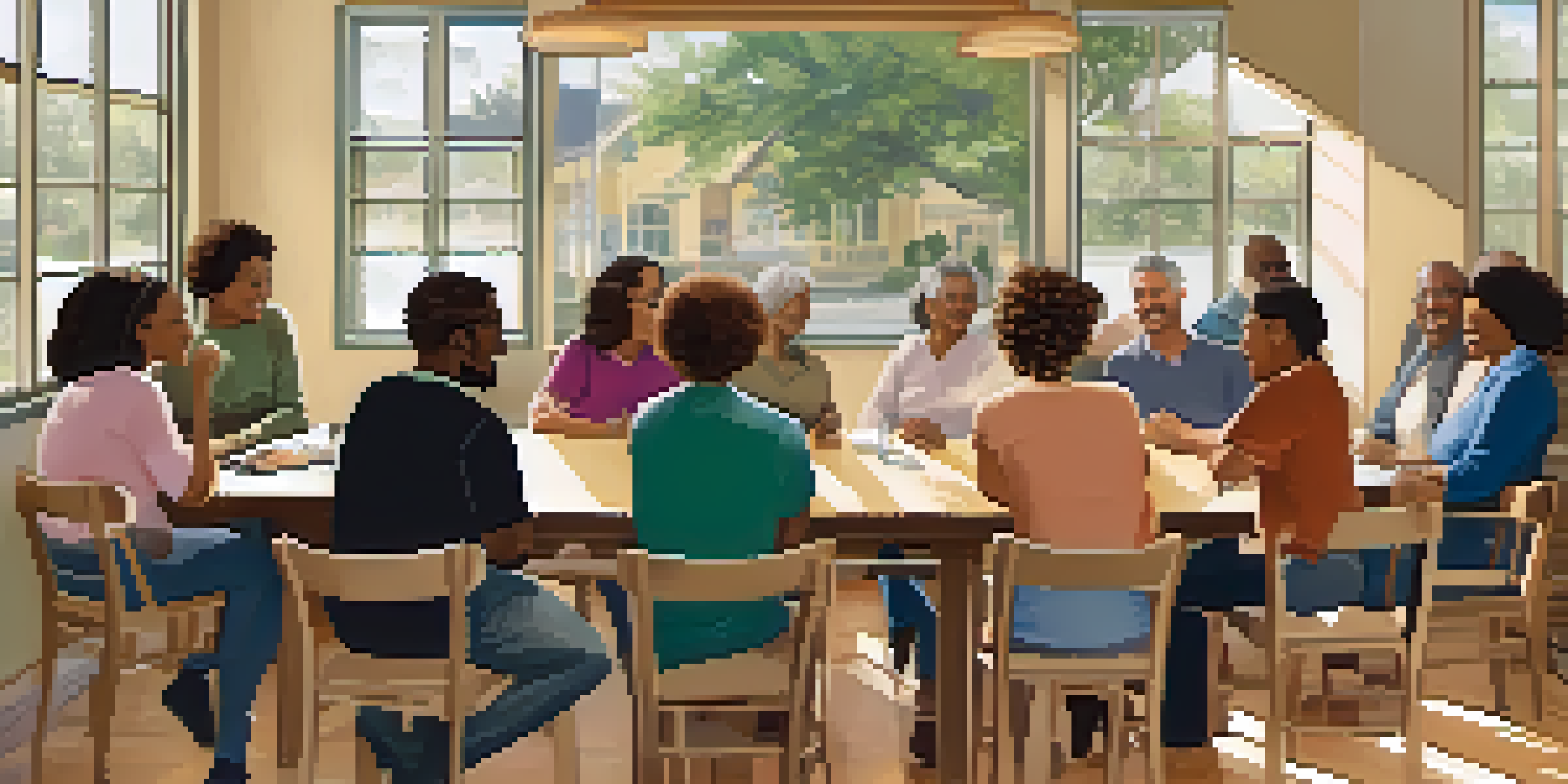How HOAs Can Support Homeowners in Financial Hardship

Understanding Financial Hardship Among Homeowners
Financial hardship can hit any homeowner unexpectedly, whether due to job loss, medical emergencies, or other crises. Understanding the unique challenges these individuals face is crucial for Homeowners Associations (HOAs). By recognizing their struggles, HOAs can adopt more empathetic policies that support those in need.
In every community, there are those who need help and those who can provide it. It is our responsibility to create an environment of support and understanding.
Many homeowners rely on their properties as their primary asset, making it particularly stressful when financial issues arise. This situation can lead to missed payments or even potential foreclosure, impacting the entire community. HOAs play a pivotal role in how these situations are handled, often determining the level of support a homeowner receives.
Moreover, by fostering an environment of understanding and support, HOAs can create a stronger, more resilient community. When homeowners feel supported during tough times, they are more likely to contribute positively to the neighborhood, benefiting everyone involved.
Creating Flexible Payment Plans for Assessments
One practical way HOAs can assist homeowners in financial distress is by offering flexible payment plans for dues and assessments. Instead of strict deadlines, HOAs can provide options that allow homeowners to pay in installments, easing their financial burden. This approach not only helps individuals but also ensures the HOA maintains a steady cash flow.

For instance, a homeowner facing short-term financial trouble might benefit from a three-month extension on their dues. This small adjustment can prevent late fees and give the homeowner the breathing room they need to get back on their feet. Such flexibility demonstrates compassion and understanding from the HOA.
Empathy in HOA Policies
HOAs can adopt supportive policies that acknowledge and assist homeowners facing financial hardships.
Additionally, implementing these plans can foster goodwill within the community. When homeowners see that their HOA is willing to work with them, it can build trust and loyalty, creating a more cohesive neighborhood.
Educating Homeowners on Available Resources
HOAs can play a vital role in connecting homeowners with local resources designed to help them during financial hardship. By sharing information about government assistance programs, non-profit organizations, or financial counseling services, HOAs can empower homeowners to take action. This guidance can make a significant difference in their ability to navigate tough times.
The greatness of a community is most accurately measured by the compassionate actions of its members.
For example, many communities have programs that offer temporary financial assistance for housing costs. By informing homeowners about these options through newsletters or community meetings, HOAs can help them find the support they need. Education is key, and HOAs can act as a bridge to valuable resources.
Moreover, organizing workshops or informational sessions can further enhance homeowners' knowledge. These events can cover topics like budgeting, financial planning, or even job search strategies, equipping homeowners with tools to improve their financial situation.
Encouraging Community Support and Solidarity
In times of financial hardship, fostering a sense of community can be incredibly beneficial. HOAs can encourage neighbors to support each other, whether through informal gatherings or organized initiatives. This sense of solidarity can create a network of support that helps homeowners feel less isolated in their struggles.
For instance, HOAs might establish a community fund that allows residents to contribute small amounts to assist their neighbors facing financial difficulties. This initiative can help cover essential costs like groceries or utility bills, providing immediate relief for those in need. It’s a powerful way to strengthen community bonds.
Resources for Homeowners
By educating homeowners about available local resources, HOAs can empower them to navigate financial challenges effectively.
Additionally, creating platforms for homeowners to share their experiences can be therapeutic. When individuals know they are not alone in their challenges, they often find strength and resilience within their community.
Implementing Temporary Fee Waivers or Reductions
Another effective strategy for HOAs is to implement temporary fee waivers or reductions for homeowners experiencing financial hardship. This approach can alleviate immediate financial pressure and help homeowners stay current on their dues. By offering this option, HOAs can demonstrate their commitment to supporting residents during tough times.
For example, a homeowner facing a sudden loss of income might struggle to pay their usual fees. By temporarily waiving or reducing these fees, the HOA can help the homeowner maintain their financial stability while preventing potential long-term consequences like foreclosure.
Moreover, these adjustments can be promoted as part of the HOA's mission to create a thriving community. When residents see proactive measures being taken, they are likely to feel more positively about their HOA and its role in their lives.
Promoting Open Communication with Homeowners
Open communication is essential between HOAs and homeowners, especially during financial hardships. HOAs should encourage homeowners to reach out if they’re struggling, fostering an environment where individuals feel comfortable discussing their challenges. This transparency can lead to tailored support that meets each homeowner's unique needs.
For example, by hosting regular meetings where homeowners can voice concerns, HOAs can identify issues early on and provide necessary assistance. Creating an open dialogue allows the HOA to respond effectively and compassionately to financial struggles, ensuring no one feels left behind.
Community Support Initiatives
Encouraging community solidarity through support initiatives can help homeowners feel less isolated during tough times.
Additionally, using multiple channels for communication—like newsletters, social media, or community boards—can help reach a wider audience. When homeowners know they can communicate openly with their HOA, it strengthens community relations and fosters a sense of unity.
Collaborating with Local Agencies for Assistance
HOAs can further support homeowners by collaborating with local agencies that specialize in financial assistance. By forming partnerships with non-profits or government organizations, HOAs can provide a broader range of resources to residents facing hardship. This collaboration can help streamline the process of obtaining support for homeowners in need.
For example, an HOA might work with a local charity that offers financial literacy programs or emergency funds. By introducing homeowners to these resources, the HOA can help them navigate their options effectively. This proactive approach not only aids struggling residents but also strengthens community ties.

Moreover, these partnerships can lead to community events that raise awareness about available assistance. By organizing informational fairs or workshops, the HOA can ensure that homeowners are informed about the help they can access, fostering a supportive environment.